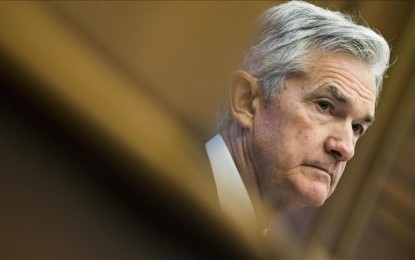
ANKARA -- The Federal Reserve Chair Jerome Powell said Wednesday that reducing the record-high inflation in the United States will require a below-trend growth in the American economy for some time.
"Reducing inflation is likely to require a sustained period of below-trend (economic) growth, and it will very likely be some softening of labor market conditions," Powell told a news conference after the conclusion of its two-day meeting.
The Fed, in its much-anticipated meeting, raised its benchmark interest rate by 75 basis points for the third consecutive time to fight record inflation, carrying the target range for the federal funds rate to the 3.00 percent to 3.25 percent range.
"We are moving our policy stance purposefully to a level that will be sufficiently restrictive to return inflation to 2%," Powell said.
He said price stability serves as the bedrock of the American economy, adding "Without price stability, the economy does not work for anyone."
Powell said the Federal Open Market Committee (FOMC) members are "acutely aware" that high inflation imposes significant hardship as it erodes purchasing power.
He said the FOMC members will be looking for "compelling evidence" over the coming months that inflation is moving down and returning to 2 percent, and added that the pace of interest rate increases will depend on incoming macroeconomic data.
Powell, however, again signaled that the Fed could put a break on rate hikes.
"At some point, as the stance of monetary policy tightens further, it will become appropriate to slow the pace of increases while we assess how our cumulative policy adjustments are affecting the economy and inflation."
Powell reiterated that the Fed will continue rate hikes "until the job is done" as he referred to lowering inflation, and echoed his comments during the Jackson Hole symposium held at the end of August.
'Failure to restore price stability would mean far greater pain'
Powell said the median for the year-end projections suggest another 125 basis points, or 100 basis points, of rate increases, but noted that the FOMC did not vote on that decision at this meeting.
"Chances of a soft-landing are likely to diminish to the extent that policy needs to be more restrictive," Powell said, stressing that failure to restore price stability would mean "far greater pain" later on.
“Restoring price stability while achieving a relatively modest increase in unemployment and a soft-landing will be very challenging. No one knows whether this process will lead to a recession, or how significant this recession will be. That's going to depend on how wage and price inflation pressures come down," he said.
Powell said higher interest rates, lower economic growth, and softening in the labor market are all painful for the American public, but said they are not as painful as failing to restore price stability.
"We have got to get inflation behind us. I wish there was a painless way to do that, (but) there isn't. What we need to do is get (interest) rates up to the point where we put meaningful downward pressure on inflation. And that's what we are doing. We need to complete this task" he said.
"It would be nice to wish (inflation) away, but there isn't. We have to get supply and demand back into alignment, and the way we do that is by slowing the economy," he added.
Powell said there is "a very high likelihood" that the US economy will have a period of below-trend and much lower growth, adding: "We are seeing that now."
He said the sectors of the American economy that are most interest rate-sensitive are certainly showing the effects of the Fed's monetary tightening, such as the housing industry, in which price increases are moving down.
"We are having an effect on interest-sensitive spending, exchange rates, exports and imports," he added. (Anadolu)
